|
|
|
Sort Order |
|
|
|
Items / Page
|
|
|
|
|
|
|
| Srl | Item |
| 1 |
ID:
157882
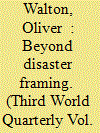

|
|
|
|
|
| Summary/Abstract |
This article examines how and why multi-mandate INGOs represent contemporary armed conflicts in particular ways. Based on empirical analysis of NGO communications and interviews with staff, it finds that these organisations typically adopt a two-track approach to representing conflicts. They use mainstream media to present consequence-oriented accounts to the general public, while utilising alternative channels to represent more nuanced depictions of conflict to more targeted audiences. These alternative forms of communication often aim to disrupt the dominant narratives of conflict produced by influential policy or media actors. Decisions about how to represent conflict are shaped by organisations’ histories, identities and funding relationships.
|
|
|
|
|
|
|
|
|
|
|
|
|
|
|
|
| 2 |
ID:
151493


|
|
|
|
|
| Summary/Abstract |
Our aim is to problematise the dominant discourses and practices around civil society from a Southern perspective. We first examine critically, from a broadly Gramscian perspective, the way in which the concept of civil society has been deployed in development discourse. This highlights its highly normative and North-centric epistemology and perspectives. We also find it to be highly restrictive in a post-colonial Southern context insofar as it reads out much of the grassroots social interaction, deemed ‘uncivil’ and thus not part of duly recognised civil society. This is followed by a brief overview of some recent debates around civil society in Africa which emphasise the complexity of civil society and turn our attention to some of the broader issues surrounding state-society relations, democracy and representation in a Third World context, exemplified through our case study research in Mozambique, Inhassunge district (Zambézia Province). The privileging of Western-type Non-governmental organizations (NGOs) as drivers of democracy and participatory development in Mozambique have considerable implications for current debates around good governance, civil society strengthening and social accountability programmes and strategies.
|
|
|
|
|
|
|
|
|
|
|
|
|
|
|
|
| 3 |
ID:
173907
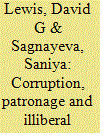

|
|
|
|
|
| Summary/Abstract |
This article engages critically with recent literature on political settlements through a case study of inter-ethnic conflict in southern Kyrgyzstan. The case study traces how a new political settlement emerged in the aftermath of conflict, despite a rejection of international proposals on conflict resolution. Instead, local elites constructed an exclusionary form of social order, forged through dispossession and violence, maintained by informal institutions of patronage and clientage. The article explains why this new political settlement appeared remarkably resilient, despite its failure to address traditional liberal concerns regarding transitional justice and minority grievances. The case study highlights two major problems with the political settlements literature. First, it contests a widespread conceptualisation of political settlements as indicating a cessation of conflict, instead pointing to how a political settlement can be initiated and maintained through different forms of violence. Second, it questions notions of inclusivity in political settlements, noting that many political settlements combine logics of both inclusion and exclusion. In many cases, they are marked by exclusionary, authoritarian practices that together constitute a form of ‘illiberal peace’. These findings caution against a simplistic use of political settlements theory to inform policies aimed at resolving internal conflicts.
|
|
|
|
|
|
|
|
|
|
|
|
|
|
|
|
| 4 |
ID:
171329
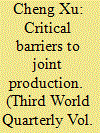

|
|
|
|
|
| Summary/Abstract |
In understanding how groups overcome collective action problems of mass mobilisation in civil wars, a joint-production explanation was put forth in the civil war literature. According to this explanation, collective action can be successful when leaders at the centre tie the public good – violence towards the overall goal of the movement – inextricably to private interests of actors at the peripheral levels of the conflict. It is through this logic of joint production that we can understand the failures of the Islamic insurgencies in Southern Philippines and the spiralling levels of violence. Where other movements cohered under a common identity, the Islamist insurgency in Southern Philippines saw high degrees of fragmentation. In this paper, I argue that cleavages of regionalism created by colonial disruptions of land and social relations became a critical barrier for insurgent joint production. Furthermore, interactions between these identities and the state can pose further collective action problems. In Southern Philippines, insurgent leaders are unable to cut across these cleavages, resulting in increasingly fragmented movements and protracted conflict. Therefore, I argue that a joint-production approach to understanding civil wars can be especially promising when culturally and historically situated to explain why collective action often fails in civil war.
|
|
|
|
|
|
|
|
|
|
|
|
|
|
|
|
| 5 |
ID:
165076
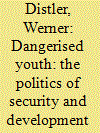

|
|
|
|
|
| Summary/Abstract |
International organisations, the national government and civil society alike have identified youth as a potential threat to the stability of the young state of Timor-Leste over the last decade. In this article, I ask how these actors define the danger of youth and what reasons they identify for the potential threat of young citizens for the society and state. Guided by a theoretical framework of Critical Security and Development Studies, I argue that while political manipulation as reason for youth violence was a prominent part of the security discourse in the years after the crisis in 2006, the discourse on the danger of youth in very recent international and national documents has been depoliticised. Despite decreasing numbers of youth-related violence, the threat construction has not vanished; rather, the language on youth has been adapted to the existing international discourse on violent youth as a threat to successful development. In this way, international and national actors have sustained the image of a society in need of management.
|
|
|
|
|
|
|
|
|
|
|
|
|
|
|
|
| 6 |
ID:
146653
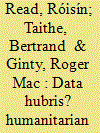

|
|
|
|
|
| Summary/Abstract |
This article looks at the promise of technology to revolutionise humanitarian action, especially in terms of the gathering and use of data. With many heralding a ‘data revolution’, the opportunities and enthusiasm for using social media and SMS data in crisis response are on the rise. The article constructs an analytical framework in order to scrutinise the three main claims made on behalf of technologically advanced humanitarian information systems: that they can access data more accurately, more quickly, and alter power relations in emancipatory ways. It does so in relation to two aspects of digital humanitarianism: visual technology and crisis mapping, and big data. The article is partly informed by a historical perspective, but also by interview and other material that suggests some of the claims made on behalf of technology are exaggerated. In particular, we argue that the enthusiasm for the data is vastly outstripped by the capacity to meaningfully analyse it. We conclude by scoping the implications of the future technological evolution of humanitarianism, in particular by examining how technology contributes to what Duffield terms ‘post-modern humanitarianism’.
|
|
|
|
|
|
|
|
|
|
|
|
|
|
|
|
| 7 |
ID:
146652


|
|
|
|
|
| Summary/Abstract |
In the aftermath of the Arab uprisings Foreign Terrorist Fighters (FTFs) have emerged as a significant security challenge. Since the 1980s and the Soviet occupation of Afghanistan the notion of a ‘foreign fighter’ has been closely linked, if not synonymous, with those ideologically or religiously motivated individuals who have travelled to join conflicts in Islamic lands. This article will explore the contemporary FTF movement, offering a comparison of Afghanistan in the 1980s and Syria in the contemporary period. It will explore the international community’s expansive responses to the challenge of FTFs, with special focus on the role of the United Nations.
|
|
|
|
|
|
|
|
|
|
|
|
|
|
|
|
| 8 |
ID:
141891
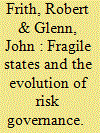

|
|
|
|
|
| Summary/Abstract |
Following the plane crashes into the twin towers of the World Trade Centre, Ulrich Beck claimed that the West would need to pursue ‘border-transcending new beginnings’ towards a more cosmopolitan world. Rather than any radical transformation along cosmopolitan lines, however, this paper maps a process of incremental reform and policy bricolage, where the post-cold war politics of intervention, and the securitisation of development, have been extended to encompass international terrorism in three overlapping phases. Although these overlapping phases – intervention, prevention and extension – are reflexive moments, they constitute a strengthening of the prevailing rationalities and technologies of risk rather than a radical rupture.
|
|
|
|
|
|
|
|
|
|
|
|
|
|
|
|
| 9 |
ID:
168486
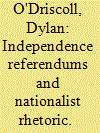

|
|
|
|
|
| Summary/Abstract |
Using the case study of the Kurdistan Region of Iraq (KRI) and the 2017 independence referendum, this article examines the nexus between independence referendums, nationalism and political power. It argues that the referendum in the KRI was held due to internal political competition and growing rebellion from the population against the poor economic performance and political situation rather than because the time was right for independence referendum. Focusing on the poor political and financial dynamics, as well as the lack of regional and international support for Kurdish independence, the article argues that independence was not a realistic goal and was rather used as a distraction amid internal turmoil. The example of the referendum in the KRI poses questions about the democratic credibility of such referenda, as the population were voting for an unachievable result and the referendum itself became a tool of internal political competition.
|
|
|
|
|
|
|
|
|
|
|
|
|
|
|
|
| 10 |
ID:
163062
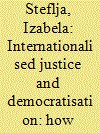

|
|
|
|
|
| Summary/Abstract |
This article examines the relationship between international criminal justice and democratisation processes in post-conflict settings, illustrating that international tribunals did not contribute to democratisation in the cases of Serbia, Kosovo and Rwanda. The argument that tribunals have willingly or inadvertently empowered local non-reformist factions is rooted in the agency of local elites. The findings suggest prioritisation of international over localised knowledge, political over victim interests and stability over judicial independence. This article makes a contribution to the emerging, critical literature on the dynamics between institutions of international criminal law and their socio-political environments, drawing attention to volatile effects of internationalised justice.
|
|
|
|
|
|
|
|
|
|
|
|
|
|
|
|
| 11 |
ID:
153267
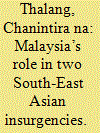

|
|
|
|
|
| Summary/Abstract |
The conflicts in Thailand’s southern border provinces and Mindanao have not only posed a challenge to the Thai and Philippine governments, but have also affected the respective governments’ relations with Malaysia. From a comparative perspective, this article aims to illustrate how a complicated web of interactions between domestic and international factors has not only shaped domestic decision-making, but also influenced how states interact with one another in regard to the conflicts, which has resulted in a mix of cooperation and contention. It is argued that despite past downturns in bilateral relations, various developments have paved the way for Malaysia to play a role in the current peace processes in Thailand’s southern border provinces and Mindanao. However, Malaysia has been able to accomplish more in Mindanao’s peace process due to several favourable conditions, including the Philippine government’s openness towards third-party involvement, regional security concerns and politics that have been less polarised until 2016.
|
|
|
|
|
|
|
|
|
|
|
|
|
|
|
|
| 12 |
ID:
154476
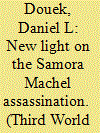

|
|
|
|
|
| Summary/Abstract |
In 1998, South Africa’s Truth and Reconciliation Commission (TRC) held hearings that investigated the possibility of foul play in the plane crash that killed Mozambican President Samora Machel on the night of 19 October 1986, near Mbuzini, South Africa. Eight persons testified in these special Section 29 hearings, held in camera because they dealt with events that remained politically volatile in the post-apartheid era. The recently declassified transcripts from these hearings strongly corroborate previous evidence indicating that the apartheid security forces caused Machel’s plane to crash, thereby eliminating one of colonialism’s most outspoken foes.
|
|
|
|
|
|
|
|
|
|
|
|
|
|
|
|
| 13 |
ID:
151512
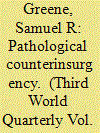

|
|
|
|
|
| Summary/Abstract |
Many voices in the US policy community have suggested that El Salvador provided a model for US counterinsurgency operations in Iraq and Afghanistan, based on the unsound contention that elections increased government legitimacy and effectiveness. The same flawed assessments were present in counterinsurgency strategy in Iraq and Afghanistan – unfounded assumptions that elections would increase legitimacy and improve institutional performance and human rights records lead to inaccurate analysis and bad strategy. Indeed, the US experience calls into question the ability of even a great power to impose legitimacy on a partner in order to wage counterinsurgency. Assuming that elections will advance such legitimacy is a dangerous pathology.
|
|
|
|
|
|
|
|
|
|
|
|
|
|
|
|
| 14 |
ID:
169119
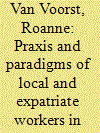

|
|
|
|
|
| Summary/Abstract |
This paper discusses practices and paradigms that expatriate and national humanitarian aid workers use to deal with major problems they encounter in their daily work. It views ‘Aidland’ as an arena where different actors encounter, negotiate and shape the outcome of aid. One of the main findings is that there are consistent differences in the way expatriate and national aid actors perceive problems in their field, as well as in the way they respond to these issues. The paper shows that these perceptions often translate into heterogeneous paradigms and practices between expatriate and national staff, particularly around remote control aid, partnerships and donor reporting. These findings are highly relevant in the current context of ‘localisation’, suggesting that the so-called North/South divide continues to exist and more explicit attention should be given in aid research to the heterogeneous strategies of different actors working in the aid sector. The paper is based on analysis of data derived from a multiple-round Delphi expert panel study involving 30 highly experienced humanitarian aid practitioners.
|
|
|
|
|
|
|
|
|
|
|
|
|
|
|
|
| 15 |
ID:
139238
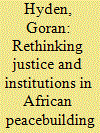

|
|
|
|
|
| Summary/Abstract |
This article argues that conflicts in Africa need to be understood in the context of local conceptions of justice, which differ from those of the liberal peace model. Justice in African society is based on the notion of reciprocity which, when practised, tends to lead to solutions that resemble prisoner dilemma games. Because agreements are more like truces than true peace agreements they are easily abandoned when the costs of adhering are higher. Bringing in these local conceptions are vital for peacebuilding in Africa but so is the need to reform them so that they become more sustainable.
|
|
|
|
|
|
|
|
|
|
|
|
|
|
|
|
| 16 |
ID:
164120
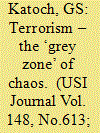

|
|
|
|
|
| Summary/Abstract |
The requirement of having some rules and laws under which war should be conducted emerged consequent to the Geneva Convention of 1864 which was basically about the “Amelioration of the Condition of the Wounded and Sick in Armed Forces in the Field”. It was only in the 1899 Hague Conference that codification of the laws of war on land, as the “Hague Conventions 1899” was undertaken. The wars post that convention used the rules that emerged, to interpret the “Jus in Bello” concept or the “Just way to wage war”. While these were infringed many times, however, the laws did rein in truant states and permitted trials of war criminals. In a short period of less than a century since the laws emerged, countries and organisations had learnt to circumvent the rules in the form of proxy wars and terrorism. In this milieu conflict is waged in a zone where the rules can be twisted and misinterpreted or waged in a manner that neither do they follow the law, nor (legally) do they infringe it. Conflict is no longer black or white, it is opaque, it is in the “Grey Zone”.
|
|
|
|
|
|
|
|
|
|
|
|
|
|
|
|
| 17 |
ID:
139230
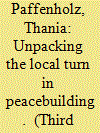

|
|
|
|
|
| Summary/Abstract |
This article undertakes a critical assessment of the local turn in critical peacebuilding scholarship. It comes to the conclusion that the local turn is hampered by a binary and essentialist understanding of the local and the international, which are presented as the only relevant locations of power or resistance. This leads to an ignorance of local elites, provides a romanticised interpretation of hybrid peace governance structures, overstates local resistance and presents an ambivalent relationship to practice. The article recommends a more nuanced understanding of the actors involved in peace- and statebuilding, based on more empirical scholarship and a multidisciplinary approach.
|
|
|
|
|
|
|
|
|
|
|
|
|
|
|
|
| 18 |
ID:
143578
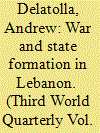

|
|
|
|
|
| Summary/Abstract |
State formation in the developing world can be explained as growing centralisation and institutionalisation. To understand why some states struggle with state formation, or the processes of centralisation, the model provided by Charles Tilly, in his analysis of state formation in Western Europe, is applied to Lebanon, starting at the onset of the 1975 civil war and concluding with an analysis of the post-Syrian occupation environment. With the appropriate conditions it is possible to use Tilly’s model of war making and the state to measure state formation, or the lack thereof, in the developing world. Conclusively, in the case of Lebanon, it is evident that progress towards strong state formation has been made because of processes of war that are similar to those Tilly outlines in his historical analysis of Western Europe.
|
|
|
|
|
|
|
|
|
|
|
|
|
|
|
|
|
|
|
|
|